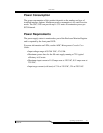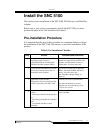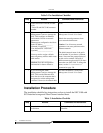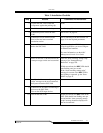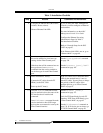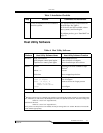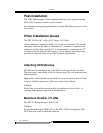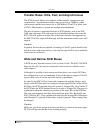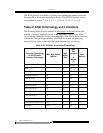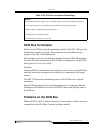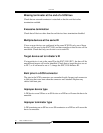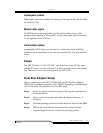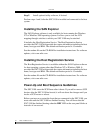
Other Installation Issues 25
6-00020-02
SNC 5100
Transfer Rates: Ultra, Fast, and Asynchronous
The SCSI protocol defines two methods of data transfer: synchronous and
asynchronous. Asynchronous transfers may run as fast as 5 MB/sec, while
synchronous transfers may run as fast as 180 MB/sec (Ultra2/3) at block sizes
of 256 k. Performance is system and configuration dependent.
The rate of transfer is negotiated between a SCSI initiator, such as the SNC
5100, and each target. For each target device identified during a bus scan, the
SNC 5100 will request a transfer rate at the fastest transfer rate supported by
the SNC 5100. The target will then reply with the maximum transfer rate it will
support.
Caution
In general, devices that are capable of running at Ultra2/3 speeds should not be
mixed on a bus with slower devices, since the bus speed will be set to match the
slowest device on the bus.
Wide and Narrow SCSI Buses
A SCSI bus may be either narrow (8 bit) or wide (16 bit). The SNC 5100 SCSI
buses are all wide, but may be connected to narrow devices with the correct
cable adapters.
Although it is possible to mix narrow and wide devices on a single SCSI bus,
this configuration is not recommended. If any of the devices supports Ultra2/3
speeds, then a mix of narrow and wide devices is prohibited.
In order for the SNC 5100 to locate and communicate with the devices, each
device on the SCSI bus must be assigned a unique target ID. On a wide (16 bit)
SCSI bus, the SCSI standard allows for a total of 16 target IDs. On a narrow (8
bit) SCSI bus, the SCSI standard allows for a total of 8 target IDs. There are no
requirements about the ordering or position of the target IDs on the SCSI bus.
The only requirement is that there be no duplicate target IDs. By default, the
SNC 5100 uses ID 7. Thus, peripheral devices may be assigned IDs 0 through 6
and 8 through 15, typically selected by a switch or jumpers. These settings may
be changed.
Caution
Make sure you do not assign more than one device on a bus to the same target
ID. This will prevent that bus from working properly.



